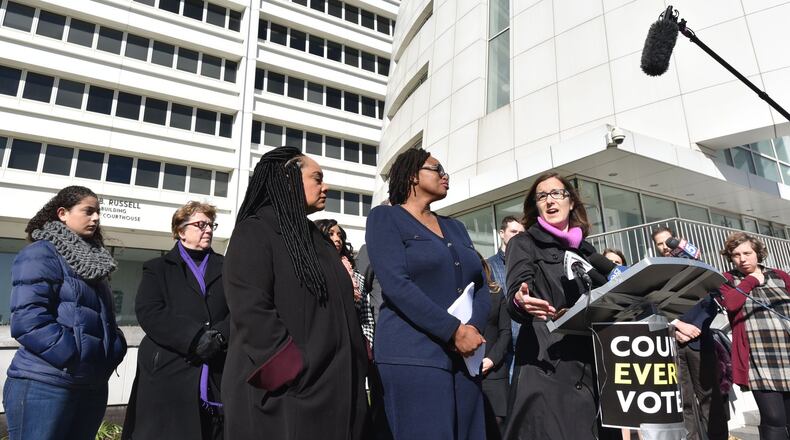A broad voting rights lawsuit filed after the 2018 Georgia election for governor is finally heading to trial as soon as February, when plaintiffs will argue that state voting laws are discriminatory and unconstitutional.
U.S. District Judge Steve Jones said in court Monday that a two-week trial could begin the week of Feb. 7, over three years after the voting rights organization Fair Fight Action sued in the wake of Democrat Stacey Abrams’ loss to Republican Brian Kemp.
It will be the first voting rights case to go to trial in Atlanta’s federal court in at least a decade.
The lawsuit initially alleged far-reaching voter suppression, but a series of court rulings eliminated many of the claims made by Fair Fight, which Abrams founded. The trial will focus on “exact match” voter registration policies, allegations of voter roll inaccuracies and inconsistent absentee ballot cancellation practices.
“My first goal is to ensure both sides have a fair trial,” Jones said. “We need to bring this case to closure.”
The trial will renew debate over allegations of voter suppression in the last governor’s race before a potential rematch between Abrams and Kemp later next year. Abrams hasn’t announced whether she’s running, but many Democrats say they expect her to enter the race.
Attorneys for the state have said Georgia’s voting practices are fair and nondiscriminatory, resulting in easy access to voting and record turnouts.
The plaintiffs will attempt to prove that the state’s voting practices infringe on fundamental rights guaranteed by the U.S. Constitution and the Voting Rights Act of 1965. If they’re successful, Jones could order changes to voting in Georgia before the 2022 general election.
“On Feb. 7, the voices of Georgia voters that were silenced by an unconstitutional and racially discriminatory system will be heard in a federal trial,” Fair Fight Action CEO Lauren Groh-Wargo said. “We look forward to continuing to share the stories of the unconstitutional barriers they have faced resulting from the malfeasance and deliberate indifference from the secretary of state.”
Josh Belinfante, an attorney for the state, said he’s ready for a trial after years of both sides gathering evidence and arguing in court.
“There’s a disconnect in what is the evidence and what are defendants going to argue,” Belinfante said. “We can go forward with the record we have — the plaintiffs lack evidence.”
Part of the case will scrutinize “exact match” voter registration practices in Georgia. Under “exact match,” election officials compare the information of new registrants with driver’s license and Social Security records. When there are inconsistencies, voters must verify their information before they can cast a ballot.
Minority voters are six to 10 times more likely than white voters to be flagged by Georgia’s “exact match” verification process, according to evidence cited in an order by Jones earlier this month.
A trial would also examine allegations that voter registration records were inaccurate, resulting in registered voters being unable to cast ballots. In addition, the lawsuit says election officials aren’t adequately trained in canceling absentee ballots, creating difficulties for Georgians who later tried to vote in person.
Jones previously threw out many of Fair Fight’s claims, ruling against challenges to registration cancellations, too few voting machines, inadequate poll worker training and ballot rejections.
But Jones allowed the case to continue on the remaining counts, refusing the state’s effort to dismiss the entire case.
The litigation resulted in the restoration of 22,000 Georgia voter registrations in late 2019 following court hearings over registration cancellations. There were still 287,000 registration cancellations that year of people who hadn’t voted since before 2012 or had moved away. An additional 101,000 voter registrations were canceled this summer.
About the Author
Keep Reading
The Latest
Featured




